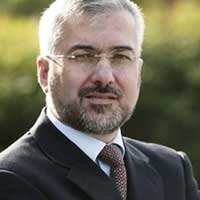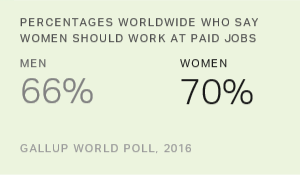
A conversation with Jihad Fakhreddine
Gallup's Regional Director for the World Poll in MENA

and Iman Berrached
Gallup's Research Program Manager for MENA
There were a lot of positive stories about rights for women in the region last year. Tunisia comes to mind. Talk about some of those changes.
Fakhreddine: I am sure Iman would have better insights about the changes there since she is a Tunisian American.
Berrached: As far as Tunisia is concerned, the last couple of years can be considered a big win for women and society. The Tunisian Cabinet recently confirmed the removal of the inheritance law that prevents females from inheriting as much as their male siblings. At the same time, the Tunisian government made sure that those on the more conservative side are not ignored. As a result, the new law has allotted women and men equal inheritance while allowing families to opt out of it.
Tunisia has also made reforms in the social sector by passing a law that forbids physical, psychological and economic abuse against women, including the harassment of women in public. The hope is that with elections coming up in Tunisia, the new government, regardless of party affiliation, continues to prioritize reform for women in Tunisia.
Yet, progress has been uneven. Women in many countries in the region still lag behind men in participating in the workforce. What does that situation look like today? Are things getting better or getting worse?
Fakhreddine: Attitudes toward women's participation in the labor force are changing extremely fast across much of the Arab world. The notion of women staying at home while men go out and work is losing ground. In Morocco, you could see truckloads of women being transported from their home villages to the farm with their faces covered. They do not want to be identified by others that they are working.
In urban areas, more women are going not only to schools but to colleges and universities. Gradually, the proportion of girls at universities is surpassing that of their male counterparts. This is empowerment. They are competing with men, who, as it is turning out to be the case, are less competitive compared with females.
It is the employers who will have to change their attitudes toward females. Last summer, my niece graduated with distinction in chemistry from the American University of Beirut. In one of the job interviews, the man interviewing her told her they were looking for a male engineer.
Berrached: Overall, female participation in the workforce has increased. The ideology of women solely as caretakers has changed across the region. Whether this can be attributed to struggling economies, access to internet platforms or merely the changing times, women in the region are definitely looking and hungry for work. The issue that plagues the region, but is not solely a MENA issue, is the lack of opportunities in slowing economies.
In the case of Tunisia, similar to Morocco, women make up a significant percentage of the agricultural sector. Waking up at the crack of dawn to be driven to the olive fields, some of these women possess degrees but were unable to find work, while others are mothers and daughters who are responsible for families just as much as the men. Whether it be rural or urban areas, in recent years, the idea of the male as the sole provider is no longer viable. The responsibility today lies with the able-bodied members of a family, including women.
The influence of social media has also contributed to the "independence" or "empowerment" of women to have more ambitious career aspirations. Social media has made the world a smaller place. Women across the world can see what other women are experiencing or what other women have accomplished or their challenges and experiences. Women in the region can see what their Western counterparts are working on and be influenced to make dreams of their own or take risks of their own.
Tell me what gives you hope for women in the region.
Fakhreddine: This is a good question. I was brought up in a family in which each female, be it my mom or sisters, lived their lives as if they had no limits on what they can do and want to achieve.
A few weeks before my eldest late sister died of cancer in early October, she was still talking about starting her Ph.D. She was teaching at the American University of Beirut.
My father passed away when we were very young, and Mom was in her early 30s. Mom took a dressmaking class in her early teens in the mid-1940s at a time when her eldest brother would go to school and she would stay at home. She ended up being one of the top dressmakers in the region where we live. My second sister, who went to university because of a scholarship, taught science for over 30 years, supported her family and sent three kids to university. This is all because of perseverance and willingness to fight social, cultural and economic odds.
As for the future, I tend to have mixed feelings about the social progress in the Arab world overall and for women. Economic stagnation will hamper their progress toward being able to have decent jobs that make them independent and secure. But that doesn't mean that males are feeling more economically secure. The social and cultural changes are happening at a fast pace -- much, much faster than the pace of economic growth or development.
Berrached: I was lucky enough to be from a country in the region (Tunisia) where generally women were encouraged to seek higher education, employment, etc. I am also the proud child of an immigrant from the region, who took it upon herself after having four children to go seek an education in hopes of one day becoming a teacher.
Today, I can proudly say my mother was successful. Her story gives me hope because throughout my childhood, my mother's only focus was education for us. She always stressed that she wanted my sisters and I to achieve more than she was able to.
This woman who emphasized education and career aspirations is the product of the MENA region. She is unique to me, but I know she is one of millions of women in the region who dream and push for a better and stronger future for their daughters. For this reason, I only have hope for the future.
Do you have any stories or examples from your work in these countries that you can share that illustrate how things are getting better for women?
Fakhreddine: I surely have many, many stories. I see women fighting for our World Poll everywhere I go. In one training session last year, I asked one interviewer to describe herself when she wakes up in the morning and goes to the field. She said, "I am a combat fighter … I go to the field to make sure that I will not get [survey] refusals."
Everywhere I go I see women committed to their work with far more passion than men. I know female interviewers who leave behind a husband while she sends her kids to schools and universities or finances the purchase of a house for her family.
Berrached: Every year that we go into the field and meet our interviewers, I am truly amazed. During the training and recruitment process, the women exude a sense of bravery and readiness I might not have seen in the past during my time in the region. They are not picky or choosy about the region of the countries they are sent to. They are not scared or discouraged at being far outside of their comfort zones. It is truly quite the contrary. They volunteer for the farther areas, where it might take longer to get to transportation or an area where generally women are not flooding the streets.
However, they see the more difficult areas as a challenge for them to accomplish and take on the next. The profile varies between college-aged women and middle-aged women with children. Regardless of the profile, all are ready to work. Despite the difficult economic situations in some of these countries and regardless of the reason behind why these women have joined the workforce, their courage and need to be challenged is a good sign for the hopefully changing tides. Of course, economic stagnation will be a determining factor in how strong or how far this tide can go.


